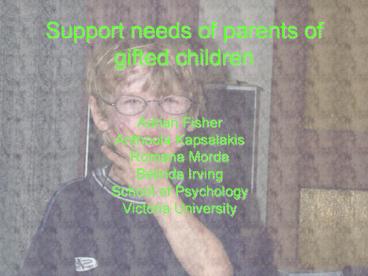Support%20needs%20of%20parents%20of%20gifted%20children - PowerPoint PPT Presentation
Title:
Support%20needs%20of%20parents%20of%20gifted%20children
Description:
Two developmental psychologists researching aspects of giftedness. Three honours students ... a number of the models around, including lists like EGPG and Oz-Gifted ... – PowerPoint PPT presentation
Number of Views:114
Avg rating:3.0/5.0
Title: Support%20needs%20of%20parents%20of%20gifted%20children
1
Support needs of parents of gifted children
- Adrian Fisher
- Anthoula Kapsalakis
- Romana Morda
- Belinda Irving
- School of Psychology
- Victoria University
2
About us
- The group keeps growing, now
- A community psychologist researching sense of
community and support - Two developmental psychologists researching
aspects of giftedness - Three honours students
- Three of the group are parents of gifted children
- One was part of a support group
- We have several visual spatial children
3
So, we have
- Professional interest and knowledge in the areas
- Professional experience in assessing and
counselling - Personal interest as parents
- A variety of experiences with schools
- A variety of experiences with VS
- Some experience in a support group for parents of
gifted children
4
Why we are here
- This is how embarrassing it gets, but the kids
were playing with the other peoples kids and the
father of the other kids said Oh, its such a
relief to meet somebody who doesnt think their
kids are bloody gifted. Its really mortifying
and it just made me feel a bit foolish, I mean,
even coming tonight, I just felt a bit, is this
really affected? (Focus group participant)
5
Literature Overview
- Most parents anticipate raising normal children
and often feel anxious and worried when faced
with raising an exceptionally unique child
(Dettman Colangelo, 1980). - Families with exceptional children are rarely
equipped to cope with the added responsibilities,
heavy obligations and the emotional and economic
drain that result from having a child with high
intellectual potential or learning difficulties
(McMann Oliver, 1988).
6
- The needs of parents with children of high
intellectual potential are more often than not,
ignored, which further heightens the issues and
challenges that parents of gifted children are
regularly confronted with, and parents of
children with average intelligence, can never
truly appreciate (Alsop, 1997 Silverman, 1986
Keirouz, 1990).
7
- Limited research that examines the challenges
faced and the psychosocial needs of parents with
children of high intellectual potential - Specific challenges include
- Negotiation of family roles and relationships
- Parental self image
- Family and relationships with schools and wider
community
8
Social Support
- Buffering provides support to overcome
immediate challenges and demands - Main effects we develop the skills and
resources to overcome later challenges.
9
Types of Support
- Emotional
- Instrumental
- Informational
- Material
10
Source of support
- Family
- Other parents at school, kinder, playgroup,
shared activities - Friends
- School
- Service providers
- Support groups mothers groups or other
11
Types of Support Groups
- Professional led groups often an adjunct to
therapy and used to monitor - Professional led 2 non-therapeutic, but
direction and content determined mostly by the
facilitator (perhaps the SENG model) - Member led, professional content
- Member led and determined a number of the
models around, including lists like EGPG and
Oz-Gifted
12
Methods
- Participants
- 18 Parents, 14 mothers and 4 fathers
- 11 children formally assessed, others in
acceleration - All but one families intact
- Data Collection
- 13 interviews
- 2 focus groups
- Phenomenological theme analysis
13
Results
- Education, education system
- Negative stories
- Patronised
- Not believed
- New teacher each year
- Crying has been effective
- Children often assessed for behavioural problems
- School shopping
- External providers limited and expensive
14
Professionals and service providers
- Cost and availability
- Suitability for the location
- Talked down to
- Assumptions made about the children or the
parents
15
Children
- Early development
- Asynchronous development
- Hidden development or parents not knowing the
difference - Boredom at school and behavioural issues
- Motivation either way
- Emotional instability
- Various issues with peers
16
Parental Stressors
- Labelling of the child and stereotyping
(resistance to use of the term gifted for their
children) - Pushed by the child
- Not able to discuss the child and parenting with
others - Balanced family life/providing stimulation
- Childs future
- Expense time and money
17
Sources of Support
- No where
- my supportno-one reallymyself
- Family
- Many a long way from families so no opportunities
- Some families more interfering than supportive
- Many families do not understand
- Schools
- We dont exist
18
Experiences of support
- Some playgroup, in another state
- Support group when first identified
- Group ceased after about 1 year
- Other support group involvement
- Good to just talk to others
- Too many professional presenters
19
Support groups ideas
- Resistance to forming a group
- Time
- Effectiveness
- Cost
- Focus and style
20
Would like
- Phone numbers
- A school mediation service
- Website with lots of information, and reviews
(schools, principals, services) - Email list
- Chance to bring the children together with others
like them - A good bottle of red and someone to have a cry
with
21
Contact
- Adrian Fisher
- School of Psychology
- Victoria University Footscray Park
- PO Box 14428
- Melbourne VIC 8001
- 03-9919-5221
- adrian.fisher_at_vu.edu.au































